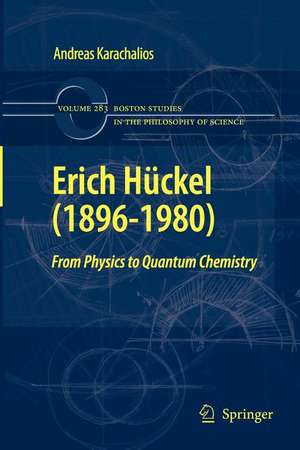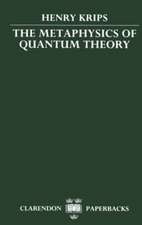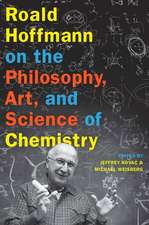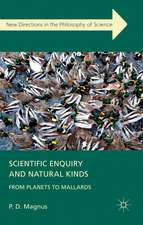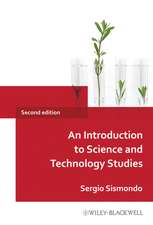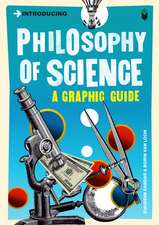Erich Hückel (1896-1980): From Physics to Quantum Chemistry: Boston Studies in the Philosophy and History of Science, cartea 283
Autor Andreas Karachaliosen Limba Engleză Paperback – 4 mai 2012
| Toate formatele și edițiile | Preț | Express |
|---|---|---|
| Paperback (1) | 636.63 lei 6-8 săpt. | |
| SPRINGER NETHERLANDS – 4 mai 2012 | 636.63 lei 6-8 săpt. | |
| Hardback (1) | 642.83 lei 6-8 săpt. | |
| SPRINGER NETHERLANDS – 4 feb 2010 | 642.83 lei 6-8 săpt. |
Din seria Boston Studies in the Philosophy and History of Science
- 18%
 Preț: 944.19 lei
Preț: 944.19 lei - 15%
 Preț: 646.75 lei
Preț: 646.75 lei - 15%
 Preț: 646.75 lei
Preț: 646.75 lei - 15%
 Preț: 699.28 lei
Preț: 699.28 lei - 18%
 Preț: 736.50 lei
Preț: 736.50 lei - 18%
 Preț: 706.87 lei
Preț: 706.87 lei - 15%
 Preț: 643.16 lei
Preț: 643.16 lei - 15%
 Preț: 650.69 lei
Preț: 650.69 lei - 15%
 Preț: 634.18 lei
Preț: 634.18 lei - 15%
 Preț: 642.68 lei
Preț: 642.68 lei -
 Preț: 391.40 lei
Preț: 391.40 lei -
 Preț: 383.33 lei
Preț: 383.33 lei - 18%
 Preț: 944.19 lei
Preț: 944.19 lei - 18%
 Preț: 955.56 lei
Preț: 955.56 lei - 15%
 Preț: 643.65 lei
Preț: 643.65 lei -
 Preț: 392.75 lei
Preț: 392.75 lei - 18%
 Preț: 1229.10 lei
Preț: 1229.10 lei - 18%
 Preț: 1238.23 lei
Preț: 1238.23 lei - 18%
 Preț: 951.29 lei
Preț: 951.29 lei - 18%
 Preț: 1223.25 lei
Preț: 1223.25 lei - 18%
 Preț: 1225.79 lei
Preț: 1225.79 lei - 18%
 Preț: 1226.42 lei
Preț: 1226.42 lei - 18%
 Preț: 1236.82 lei
Preț: 1236.82 lei - 15%
 Preț: 644.49 lei
Preț: 644.49 lei - 18%
 Preț: 1231.78 lei
Preț: 1231.78 lei - 15%
 Preț: 644.30 lei
Preț: 644.30 lei - 18%
 Preț: 957.62 lei
Preț: 957.62 lei - 18%
 Preț: 1222.49 lei
Preț: 1222.49 lei - 18%
 Preț: 947.50 lei
Preț: 947.50 lei - 18%
 Preț: 1833.95 lei
Preț: 1833.95 lei - 18%
 Preț: 1227.99 lei
Preț: 1227.99 lei - 18%
 Preț: 947.35 lei
Preț: 947.35 lei
Preț: 636.63 lei
Preț vechi: 748.97 lei
-15% Nou
Puncte Express: 955
Preț estimativ în valută:
121.85€ • 126.73$ • 102.11£
121.85€ • 126.73$ • 102.11£
Carte tipărită la comandă
Livrare economică 14-28 martie
Preluare comenzi: 021 569.72.76
Specificații
ISBN-13: 9789400731554
ISBN-10: 9400731558
Pagini: 220
Ilustrații: XVII, 200 p.
Dimensiuni: 155 x 235 x 12 mm
Greutate: 0.31 kg
Ediția:2010
Editura: SPRINGER NETHERLANDS
Colecția Springer
Seria Boston Studies in the Philosophy and History of Science
Locul publicării:Dordrecht, Netherlands
ISBN-10: 9400731558
Pagini: 220
Ilustrații: XVII, 200 p.
Dimensiuni: 155 x 235 x 12 mm
Greutate: 0.31 kg
Ediția:2010
Editura: SPRINGER NETHERLANDS
Colecția Springer
Seria Boston Studies in the Philosophy and History of Science
Locul publicării:Dordrecht, Netherlands
Public țintă
ResearchCuprins
Erich Hückel’s Education and Scientific Awakening: The Path to Quantum Chemistry.- Erich Hückel’s Research Agenda During the 1930s: Underpinning Organic Chemistry with Quantum Theory.- The Controversy Between Erich Hückel and Linus Pauling over the Benzene Problem.- Linus Pauling’s Breakthrough to the Theory of Aromatic Compounds and Hückel’s Reaction.- Hückel’s Efforts to Disseminate His Theory and Its Reception.- Hückel’s Professional Career in National Socialist Germany.- The Postwar Years.- Summary and Concluding Remarks.
Recenzii
From the reviews:
“Andreas Karachalios produced a well researched and meticulously documented biography of Erich Hückel … . It is readable and contains a considerable amount of theoretical chemistry that allows not only the evaluation of Hückel’s oeuvre, but informs also about the early development of quantum chemistry in the 1920s and 1930s. It is warmly recommended to all theoretical and computational chemists and to all others who are interested in the history of chemistry during the first third of the twentieth century.” (Istvan Hargittai, Structural Chemistry, Vol. 21, 2010)
“This is an important and much needed book. I consider it a must buy for historians of quantum chemistry. Now what we need next is an English translation of Hückle’s autobiography. Chemical Heritage Foundation, are you listening?” Dr. E. Thomas Strom, Dept of Chemistry and Biochemistry, university of Texas Arlington, Arlington, TX 76019-0065
With kind permission of Bulletin for the History of Chemistry, vol 35, No. 2 2010
“Andreas Karachalios produced a well researched and meticulously documented biography of Erich Hückel … . It is readable and contains a considerable amount of theoretical chemistry that allows not only the evaluation of Hückel’s oeuvre, but informs also about the early development of quantum chemistry in the 1920s and 1930s. It is warmly recommended to all theoretical and computational chemists and to all others who are interested in the history of chemistry during the first third of the twentieth century.” (Istvan Hargittai, Structural Chemistry, Vol. 21, 2010)
“This is an important and much needed book. I consider it a must buy for historians of quantum chemistry. Now what we need next is an English translation of Hückle’s autobiography. Chemical Heritage Foundation, are you listening?” Dr. E. Thomas Strom, Dept of Chemistry and Biochemistry, university of Texas Arlington, Arlington, TX 76019-0065
With kind permission of Bulletin for the History of Chemistry, vol 35, No. 2 2010
Textul de pe ultima copertă
This study, the first comprehensive account of Erich Hückel's career, examines his scientific work as well as his importance for the emergence of quantum chemistry as an independent discipline in Germany during the 1930s. Hückel began his career by studying quantum physics in Göttingen, but his background in chemistry led him to take up pioneering research on the physics of chemical bonding.
Drawing on a variety of sources, Andreas Karachalios offers a probing account of fast-breaking developments in quantum theory that paved the way for Hückel's research. In Göttingen and later in Leipzig, Hückel interacted with leading figures not only in quantum physics and physical chemistry but also with others in nearby fields, including organic chemistry and mathematics.
During his later career in Marburg, Hückel clashed with Linus Pauling over the properties of the benzine molecule. In order to appreciate this controversy, Karachalios gives a brief account of the mathematical formalism of spin invariants, with both Hückel and Pauling used in their analyses, though with different interpretations. This serves not only to clarify their differences but also to illustrate the importance of the quantum-mechanical theory of resonance for chemistry at this time.
Drawing on a variety of sources, Andreas Karachalios offers a probing account of fast-breaking developments in quantum theory that paved the way for Hückel's research. In Göttingen and later in Leipzig, Hückel interacted with leading figures not only in quantum physics and physical chemistry but also with others in nearby fields, including organic chemistry and mathematics.
During his later career in Marburg, Hückel clashed with Linus Pauling over the properties of the benzine molecule. In order to appreciate this controversy, Karachalios gives a brief account of the mathematical formalism of spin invariants, with both Hückel and Pauling used in their analyses, though with different interpretations. This serves not only to clarify their differences but also to illustrate the importance of the quantum-mechanical theory of resonance for chemistry at this time.
Caracteristici
First comprehensive account of Erich Hückel’s career and work Insight in the start of the field of quantum chemistry Study of Hückel’s private correspondence and personal files from Marburg and the Rockefeller Archive Center
